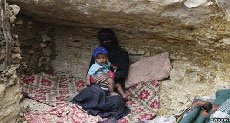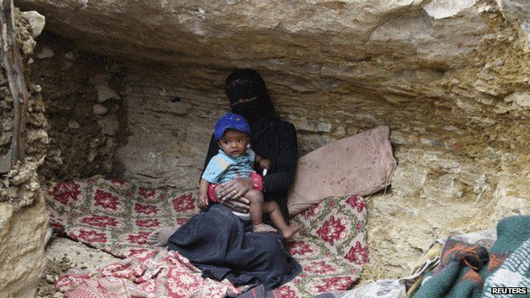
In Yemen War, Hospitals Bombed to Rubble, Starvation Spreads

Noah Browning - Thomson Reuters
Elderly Hamama Yousif was rushed to the main hospital in one of Yemen's largest cities after an artillery round lashed her chest with shrapnel, only to find that the doctors there had run out of the oxygen tanks needed to save her life.

In a video captured by local news station Yemen Youth TV, worried relatives carry her, still talking, to almost every clinic and hospital in the war-torn city of Taiz - none had any oxygen - until motionless and dead, she was finally taken to the morgue.
Once known as "Arabia Felix" or happy Arabia, Yemen has been disfigured by 10 months of war into one of the worst humanitarian crises in the world, where over half the population faces hunger and not even hospitals are spared.
The wounded and the dying find little comfort in al-Thawra hospital in the southwestern city of Taiz: Pressure from nearby shelling has blown out all the windows and several direct hits have reduced one ward nearly to dust.
"Our situation is disastrous in every possible way," said Sadeq Shujaa, head of the local doctor's union.
"Shelling hit the only cancer hospital and the children's hospital, shutting them down. The war has sent doctors fleeing for their lives to the countryside and siege tactics mean we have to smuggle in medicine through mountain passes."
Taiz is ...one of the worst fronts of the war.
After the government fled into exile, a Saudi-led alliance of Arab states joined the war to restore it, recapturing the port city of Aden where President Abd Rabbu Mansour al-Hadi is now based.
Riyadh and its allies have launched hundreds of air strikes, sent in ground troops and set up a naval blockade to restrict goods reaching the country....
"The war has sent doctors fleeing for their lives to the countryside and siege tactics mean we have to smuggle in medicine through mountain passes" Shadeq Shujaa, Head of local doctor's union.
STAGGERING CRISIS
The fighting has killed around 6,000 people, about half of them civilians. Many times more are now in danger as a result of the humanitarian catastrophe wrought by the conflict.
The UN Food and Agricultural Organization [FAO] warns of a "staggering" food crisis, saying famine looms as over half the population or some 14.4 million people are food insecure.
"The economy shrank by 35 percent in 2015. People who used to have decent standards of living have become Yemen's 'new poor' because with no electricity to power their business and no fuel to get anywhere, they have no way to earn money," said Mohammed al-Assadi of UNICEF.
"2.4 million people are internally displaced. In these conditions there's no easy access to basic hygiene or healthcare, and now about 320,000 children under five years old are severely malnourished," he added.
On the outskirts of Sanaa and in towns outside Taiz, clusters of shabby tent encampments housing thousands of families fleeing nearby violence have cropped up, where jobless parents idle and many children shrivel with hunger.
In peacetime, impoverished Yemen imported 90 percent of its staple foods. Much of the 4 percent of the arid country that is arable land now lies untilled because of the war.
"Besides the humanitarian catastrophes, a lack of jobs paves the way for a social and political crisis in which work skills erode and some people join the war effort to earn a living, feeding a cycle of violence," said Salah Elhajj Hassan of FAO.
HIDING IN CAVES
Workers from the medical charity Medecins Sans Frontieres [MSF], among the few foreign aid groups operating in Yemen's worst war zones, have suffered repeated attacks in the far northern province of Saada straddling the Saudi border.
An ambulance from an MSF-affiliated hospital rushed to the scene of a suspected Saudi-led air strike on Jan. 21, but just as crowds gathered to assist the victims another bomb fell and killed a medic.
An MSF hospital was bombed on Oct. 27 in what the Saudi-led coalition says was a strike intended to target militiamen nearby....
Fear now reigns even where aid is available. MSF official Teresa Sancristoval said in a statement that most of the 40,000 residents in an area near an MSF hospital bombed on Jan. 10 now live in caves to avoid Saudi-led air strikes.
"Since the attack, there have been no deliveries in the maternity room - pregnant women are giving birth in caves rather than risk coming to the hospital," she said
Comments



